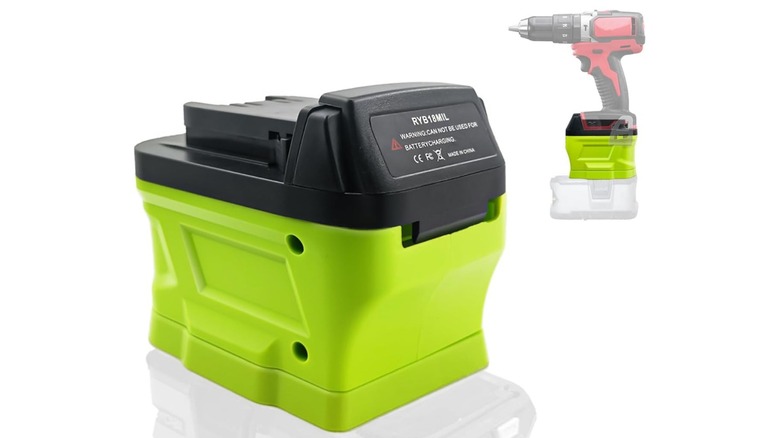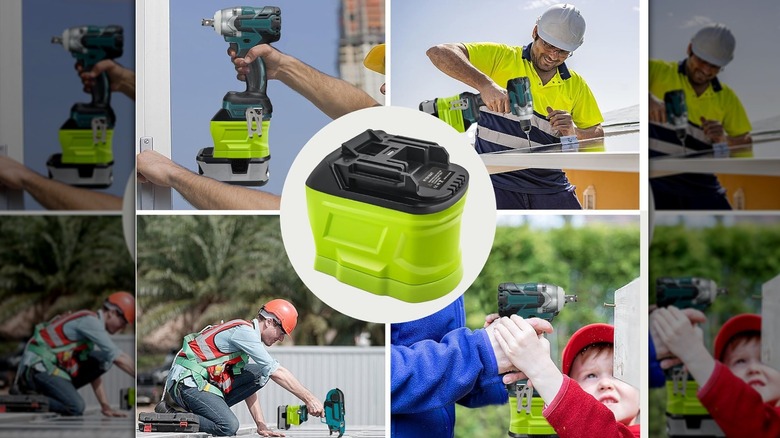Ryobi Battery Adapters: What Are They & How Exactly Do They Work?
We may receive a commission on purchases made from links.
Cordless power tools can be expensive, and one of the biggest factors that drives up the price is the batteries that power them. There are a couple of reasons why these batteries cost so much. The first is that most modern batteries use lithium-ion cells, which are made from rare-earth materials that aren't cheap to come by. The second is that most power tool brands make their batteries proprietary. So, while they are typically interchangeable across tools of the same voltage within the brand, they are not usually physically compatible with tools from other brands. This means that anyone who is looking to buy a tool from a brand that they don't already have a battery for will probably need to buy one — unless they have an adapter.
Ryobi battery adapters are listed for sale on Amazon, eBay, and other major online retail sites. These are third-party products that allow products to function in tandem that would not normally work together. Ryobi's 18V One+ Batteries have a solid reputation in the power tool community, and they tend to run a bit cheaper than those sold by other major brands such as Makita, Milwaukee, and DeWalt, so it's natural that many craftspeople might be curious to learn a bit more about what these adapters are and how they work.
How do Ryobi battery adapters work?
There are a few non-Ryobi products out there that work with Ryobi batteries out of the box, but most of them will need battery adapters to be able to connect. These are plastic attachments that have two sides. One side is moulded to mimic the connective dock that a Ryobi 18V tool would have. The other side is molded to replicate the battery that would typically be used with the tool you're trying to connect to (Makita, Milwaukee, DeWalt, etc.)
In their simplest form, these adapters simply transmit power and make incompatible tools fit together. Some of them have more intricate internal mechanisms, however. There are Ryobi battery adapters out there that have internal voltage regulation hardware built in. These adapter can lower the battery's 18V current to 12V making them suitable for a wider range of tools. Some may even have additional USB or USB-C ports so that you can use Ryobi batteries to power and charge devices that aren't power tools at all.
On top of all that, these adapters are significantly cheaper than the batteries that they can save you from buying, with most of them costing somewhere in the neighborhood of $10 to $20.
Using Ryobi battery adapters can be dangerous
It isn't hard to see why budget-conscious power tool collectors might find them attractive, but there are a few potential drawbacks you should be aware of. As mentioned above, none of the adapters that are made for Ryobi batteries are actually made by Ryobi. They are all made by third-party manufacturers. There are a few reasons why this might be a problem, but the biggest is that aftermarket electrical add-ons can potentially damage your battery and your tool.
Power tools are designed specifically to interact with the manufacturer's proprietary battery. Some batteries, like those from Makita, have communications tech that allows the tool and battery to exchange information. This doesn't work with third-party devices, and that lack of communication can cause problems and override many of the tool's built-in safety mechanisms. But more importantly, even slight fluctuations in connectivity or voltage can cause issues to occur that can damage your equipment and may void your warranty.
The Ryobi 3-Year Warranty that applies to the company's batteries states, "This warranty only covers defects arising under normal usage and does not cover any malfunction, failure or defects resulting from misuse, abuse, neglect, alteration, modification or repairs by other than Authorized Service Centers." Using a battery adapter could easily be interpreted as an "alteration" or "modification" and so Ryobi would not be liable for any damage that occurred when using the adapter. Most other manufacturers have similar clauses as well.


